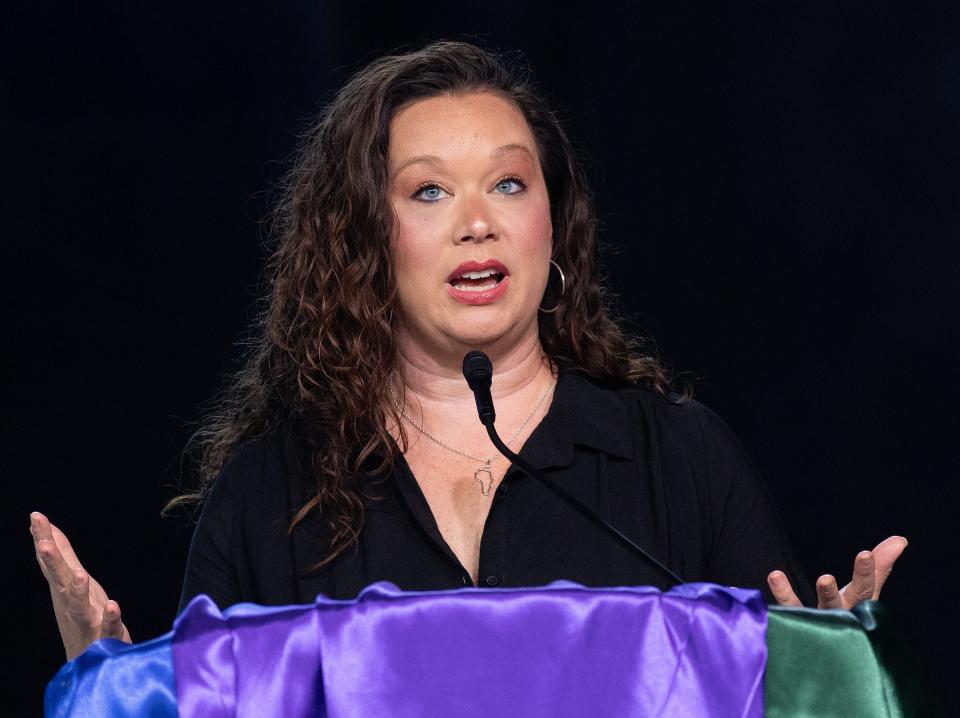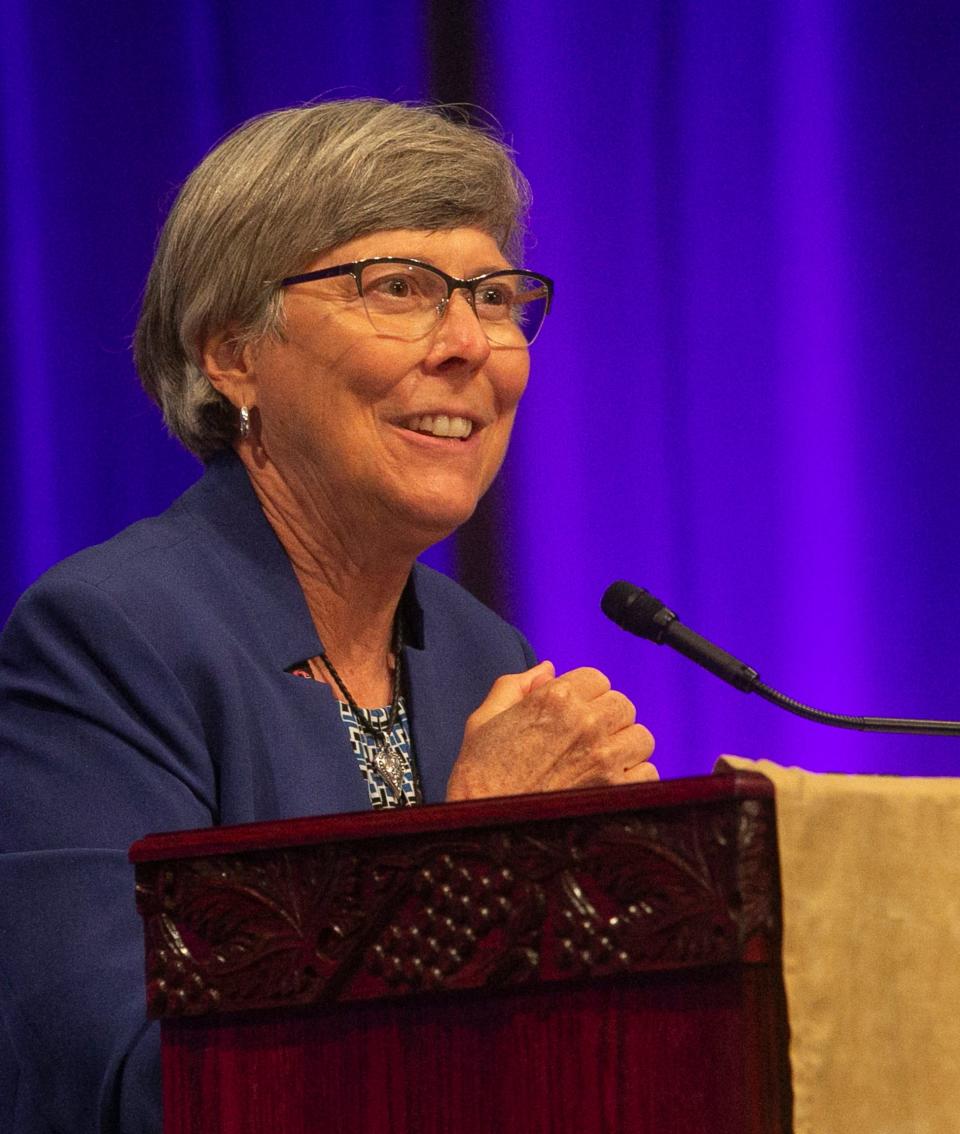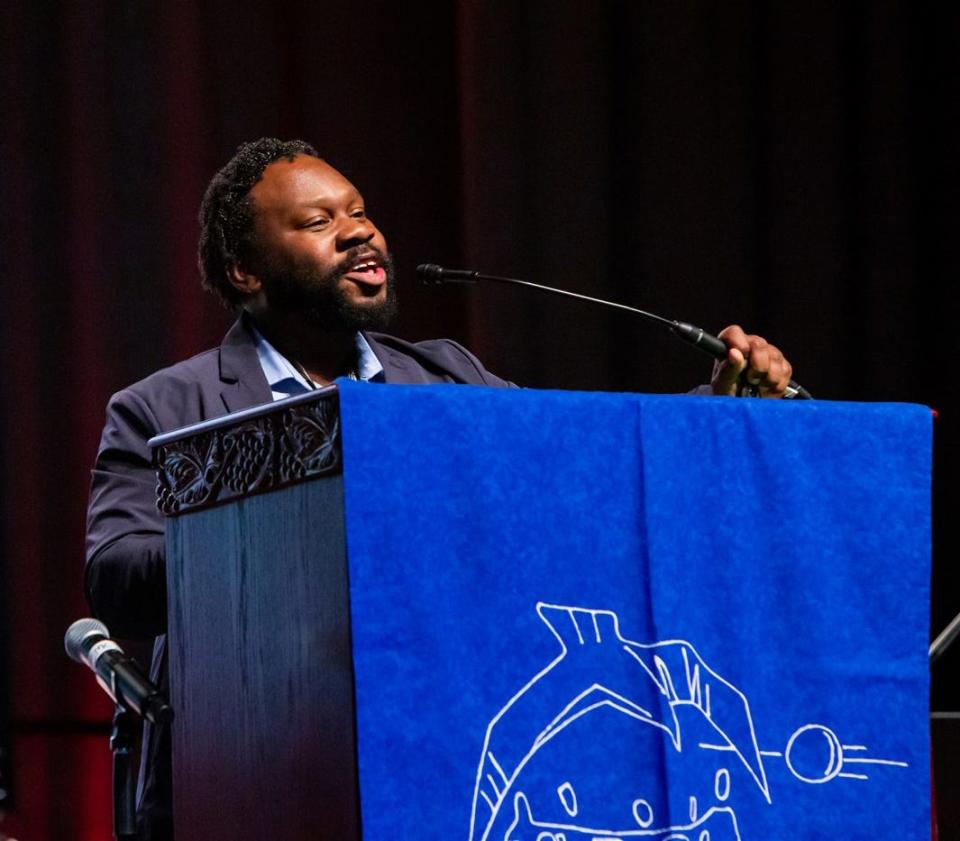'Very liberating': Local Methodists exult in new openness toward LGBTQ clergy, members
As a young seminary student at Emory University in 1972, Larry Rankin heeded a professor’s suggestion to attend the General Conference of the United Methodist Church, taking place that year in Atlanta.
“You're going to learn more about the United Methodist Church at the General Conference than you would in the classroom,” the professor said.
As it happened, Rankin and his fellow students witnessed the first stage of a drama that would roil the denomination for more than five decades. Delegates approved the insertion of language into official doctrine declaring homosexuality to be “incompatible with Christian teaching.”
Last week, following years of debate and a convulsion that saw one-quarter of churches depart the denomination, delegates at the United Methodist Church’s global meeting overwhelmingly voted to delete the doctrinal language, while affirming that the ordination of LGBTQ pastors and the performance of same-sex weddings in churches are now allowed.
“That journey that I've been through in the last 52 years, there's always been a sense of, ‘I love my church. I agree mostly with its theology, its mission, except for that one thing — that one thing of exclusion of LGBTQ,” said Rankin, now a retired minister living in Lakeland. “Now I feel I can fully embrace my church, and I'm very, very hopeful for the future of the church, even though we've lost a quarter, nationally, a quarter of our churches.”
Delegates at the General Conference of the United Methodist Church in Charlotte, North Carolina, voted 523 to 161 to strike the passage condemning homosexuality from the denomination’s Social Principles. Delegates, who included church leaders, clergy and lay members from throughout the world, separately voted to rescind the ban on ordaining LGBTQ clergy, which dated to 1984.
The United Methodist Church, one of the world’s largest Protestant denominations with an estimated 5.4 million members in the United States and nearly 10 million globally, has been riven by conflict in recent decades, largely involving disagreements over LGBTQ issues.
Since the 1972 meeting, delegates had added language in the guiding literature that broadened the restrictions on full participation in church life by LGBTQ people. Disagreements among more conservative and more progressive congregations have emerged at General Conferences, typically held every four years.
At a 2019 special session in St. Louis, some delegates pushed for adoption of the One Church Plan, which would have allowed individual churches to set their own policies on LGBTQ clergy and same-sex weddings. Instead, delegates approved the Traditional Plan, which reasserted the restrictions.
The following year, the denomination adopted a framework for allowing individual congregations to “disaffiliate,” or leave the denomination, by the end of 2023. In Florida, nearly 200 churches sought and were granted departures, including several in Polk County.
Nationwide, more than 7,000 churches, or about one-quarter of the denomination’s total, chose to divorce. Those tended to be more conservative churches whose leaders anticipated the denomination’s adoption of more open policies toward LGBTQ clergy and congregants, and many joined the newly created Global Methodist Church.
As that process unfolded, more than 100 churches — three from Polk County — joined a lawsuit seeking to accelerate their departures from the Florida Conference of the United Methodist Church, which is based in Lakeland. A judge dismissed the lawsuit last year.
On an international scale, the COVID-19 pandemic delayed the denomination’s efforts to resolve the lingering issues. Church leaders postponed the global conference three times before it finally occurred last week.
'Tears of relief'
Molly McEntire, missional engagement team lead for the Florida Conference, attended the gathering as its head lay delegate. McEntire, who strongly favored removing the official language on sexuality and the restrictions on LGBTQ participation, said she expected a more contentious meeting.
Two proposals — rescinding the ban on ordination of LGBTQ clergy and penalties for clergy who officiate at same-sex weddings — appeared on the meeting’s consent calendar, a list of items to be approved as a block and without debate.
“We did not expect it to go that smoothly,” McEntire said. “For (those items) to not be removed from the consent calendar was a historical thing alone.”
The vote to strike the 1972 language on homosexuality followed about 90 minutes of debate, United Methodist News reported. Delegates also voted to affirm marriage between adults of consenting age, regardless of gender, as “a sacred, lifelong covenant” that yields a “deeper relationship with God and the religious community.”
After the vote, many delegates gathered during the next break period to honor the moment, McEntire said.

“There were tears of relief and just tears of joy,” she said. “So many people have worked so long for this. And just to finally feel welcomed in the church and to tell our younger generations, ‘You matter, no matter how you identify,’ that was just huge. After that session, we were able to just come together and sing hymns and pray, and it was just, it was a beautiful, beautiful moment.”
McEntire said she met at the conference with a clergy member who had long been forced to conceal their LGBTQ status for decades. That person talked of attending the General Conference in 2000 and joining others to protest the ban, leading to an arrest that left the clergy member with a felony record.
“I have been on this journey for — not as long as many other people — but since 2015, and for me, it was an incredible sense of relief and peace, because many of my friends and family haven't felt welcome, due to so many of these mandates in the Book of Discipline,” McEntire said. “So I finally just felt this peace that my denomination, my church, will be fully welcoming of all people.”
Bishop Tom Berlin, the leader of the Florida Conference of the United Methodist Church, described the spontaneous, post-vote huddle as “a really wonderful expression of a church that celebrates everyone.”
Berlin, who succeeded Bishop Ken Carter last year, welcomed the resolution of the debate over doctrinal matters.
“I think this is the culmination of a very long and contentious conversation that ended amicably, kindly and hopefully,” Berlin said Monday. “And I think that United Methodists are long ready to begin focusing on their ministry and their desire to reach people in our communities. And we can honestly say now that we want to reach everyone.”
Berlin said he appreciated a lessening in the rancor that pervaded discussions at previous conferences.
“There was just a total different spirit,” he said. “I think a lot of people are tired of division and tired of anger. And I think that we had an experience as a church that showed the joy of working together, instead of being frustrated with each other.”
Opening new chapters
Alice Williams of Orlando and Derrick Scott III of Jacksonville attended last week’s meeting as co-lay leaders of the Florida Conference. Williams, 67, said she is a lifelong Methodist who identifies as LGBTQ.
Williams volunteered at the General Conference held in 2012 in Tampa, and she said the experience showed how significant the disagreements over LGBTQ inclusion were in the denomination. Four years later, she attended the global meeting in Portland, Oregon, as a delegate, along with Scott and McEntire.
An impasse at that meeting yielded the creation of the 32-member Commission on a Way Forward, to which Williams was one of three LGBTQ members appointed. Church leaders assigned the panel to thoroughly review the denomination’s Book of Discipline and suggest revisions to the passages covering human sexuality.
“We've been there before when it was so, so contentious,” Williams said. “We were there in 2019, when it was not so good, for the special session. So coming to this (conference) was just such a different feeling.”
After the historic vote, Williams joined other delegates and some regional bishops in gathering to pray and sing hymns.
“It was just a moment where we celebrated our unity and being United Methodists in this day, and I think I will forever remember that, being a part of that,” Williams said.

Scott, a featured speaker at the 2022 meeting of the Florida Conference in Lakeland, described last week’s actions as completing a long arc of reconciliation.
“And so, it just felt like we were closing some chapters that needed to be closed, so that new chapters could begin,” Scott said. “I think, again, for me, we did what we were sent to the General Conference to do — to reverse the Traditional Plan, specifically, but I think also to reverse the restrictive and discriminatory language altogether. That's what we were sent to do.”
The Rev. Michael LeBlanc, pastor of Shepherd’s Community United Methodist Church in South Lakeland, followed the reports from the meeting online. LeBlanc, who joined the church in 2021 after a decade in youth ministry, welcomed the revisions in doctrine and policies.
“Yeah, other clergy are really excited that when we say ‘all are welcome,’ we can really mean that wholeheartedly now,” he said. “We can say that everyone's welcome and that everyone that's called can fulfill that call. … It’s wonderful to know that nothing, other than the hard work it takes to become a pastor, stands in the way of people willing to answer that call. And so that's really good.”
Rankin, who did not attend the conference, expressed relief that the condemnation of homosexuality is gone after 52 years.
“Personally, and as a pastor, I feel very liberated to exercise my duties and exercise my ordination in the best way I professionally know how to act and how to how to respond,” he said. “It's a very liberating experience for me, and I'm very joyful of this decision.”
Varied views allowed
The revision of the denomination’s Social Principles leaves flexibility for local clergy and churches. No congregation will be forced to accept the appointment of an LGBTQ pastor, and churches are not required to host same-sex weddings.
Delegates also voted to allow autonomy among the church’s global jurisdictions: the United States, Africa, Europe and the Philippines.
“We will have congregations that will not want a queer clergy person,” Scott said. “We will have congregations that will not want to host same-gender unions and marriages in their buildings. And we're going to learn how to live in one church together with those congregations.”

LeBlanc said he does not have the authority to decide what weddings will take place at his church.
“But for weddings that I choose to do as a clergy person, I'm excited that I can say yes to people for the right reasons and I can say no to people for the right reasons, as well,” he said.
McEntire said that the denomination has recognized that a range of views on sexuality exist in its churches.
“What is beautiful about this is it holds space for differing opinions in the United Methodist Church,” she said. “So you're allowed to have a different opinion and still be part of the United Methodist Church. And that's what we want. We want everyone in the United Methodist Church to stay, and even those that left, we passed (a rule) that they are allowed to come back.”
LeBlanc said he tells people that the United Methodist Church is varied enough to claim both former President George W. Bush and former Secretary of State Hillary Clinton as members.
“What I love about it is that not only are we finally able to minister to all the people, but it also leaves space for people who don't know where they stand on LGBTQ inclusion,” LeBlanc said. “We get to be a church for all, including more conservative members of my local church that don't know if they're ready to celebrate marriage or full inclusion. It gets to be a place where they can come and feel safe and loved alongside members of my church who are gay and who are married.”
All of those interviewed seemed confident that the United Methodist Church has turned an important corner. Berlin said he hopes the historic actions will bring people into the church who might not have felt entirely welcome.
“I think it's going to also affect the invitations that are given,” he said. “I think that there are some people who have relatives and friends and co-workers who are LGBTQ people. And I think what this does is it gives them a greater opportunity to invite their friends in a sincere fashion, knowing that that's not going to be a roadblock for them, that's not going to be an obstacle for them.”
Williams said that Methodists must now fulfill the promise created by the change in official doctrine.
“Part of our work is now that we got to live into what we've claimed we want to be, and that's going to take some work because the world is watching,” she said. “Not every LBGTQ brother and sister of mine is going to come running through the door of a church now, just because this has happened. And quite honestly, we shouldn't be looking for folks to run through our doors. We need to be out where they are and helping them to find their own relationship with God and their own calling.”
Gary White can be reached at gary.white@theledger.com or 863-802-7518. Follow on X @garywhite13.
This article originally appeared on The Ledger: Local Methodists exult in new openness toward LGBTQ clergy, members

